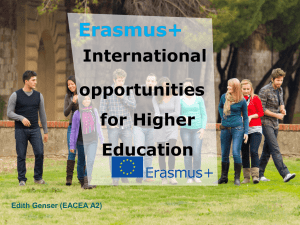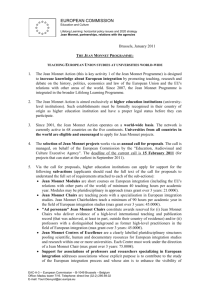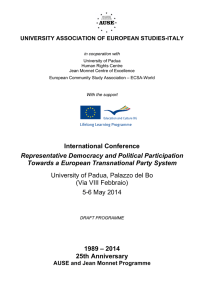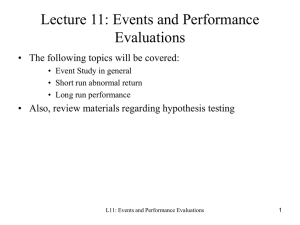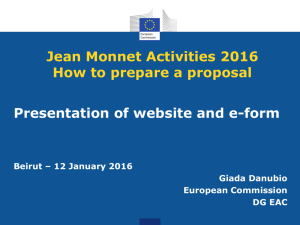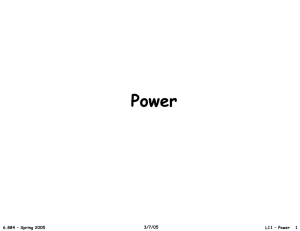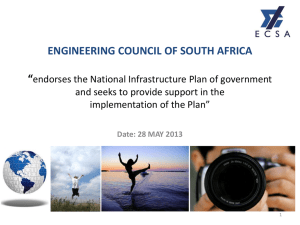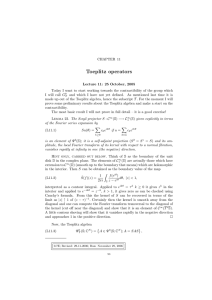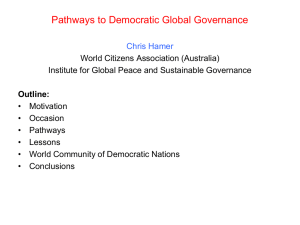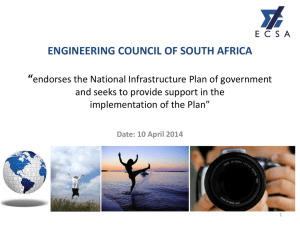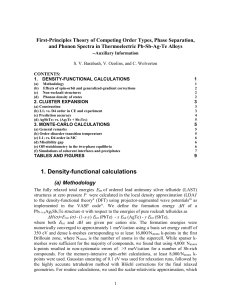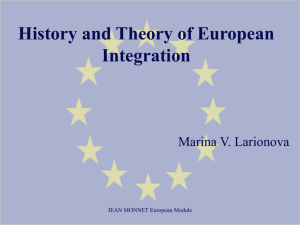background document (300 kB)
advertisement
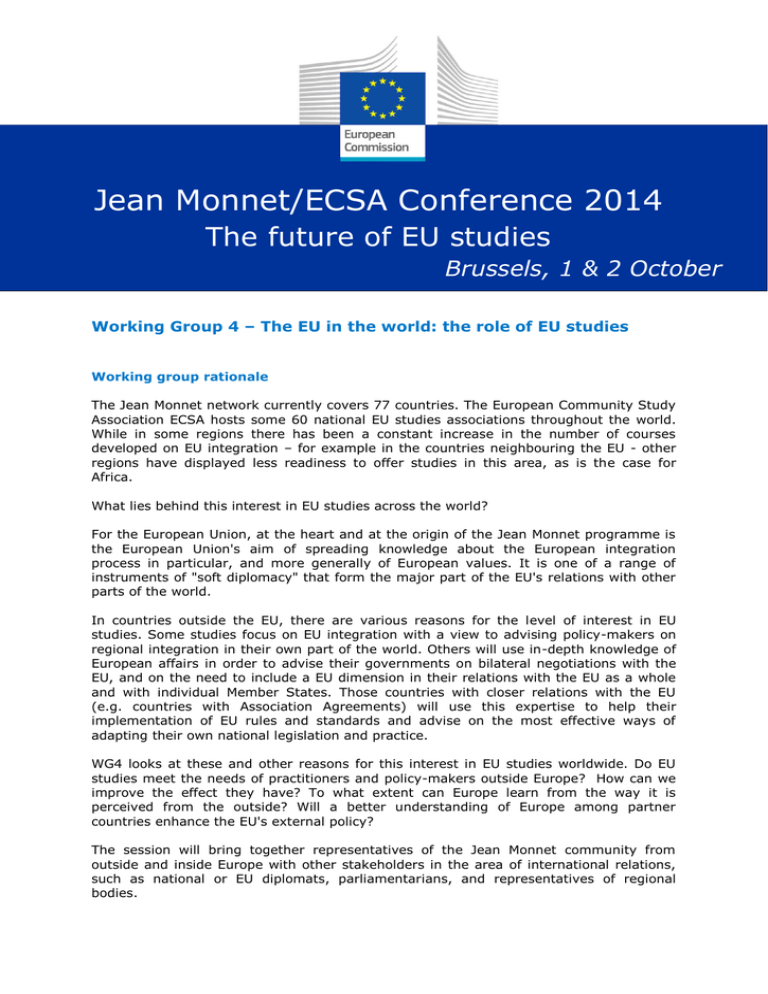
Jean Monnet/ECSA Conference 2014 The future of EU studies Brussels, 1 & 2 October Working Group 4 – The EU in the world: the role of EU studies Working group rationale The Jean Monnet network currently covers 77 countries. The European Community Study Association ECSA hosts some 60 national EU studies associations throughout the world. While in some regions there has been a constant increase in the number of courses developed on EU integration – for example in the countries neighbouring the EU - other regions have displayed less readiness to offer studies in this area, as is the case for Africa. What lies behind this interest in EU studies across the world? For the European Union, at the heart and at the origin of the Jean Monnet programme is the European Union's aim of spreading knowledge about the European integration process in particular, and more generally of European values. It is one of a range of instruments of "soft diplomacy" that form the major part of the EU's relations with other parts of the world. In countries outside the EU, there are various reasons for the level of interest in EU studies. Some studies focus on EU integration with a view to advising policy-makers on regional integration in their own part of the world. Others will use in-depth knowledge of European affairs in order to advise their governments on bilateral negotiations with the EU, and on the need to include a EU dimension in their relations with the EU as a whole and with individual Member States. Those countries with closer relations with the EU (e.g. countries with Association Agreements) will use this expertise to help their implementation of EU rules and standards and advise on the most effective ways of adapting their own national legislation and practice. WG4 looks at these and other reasons for this interest in EU studies worldwide. Do EU studies meet the needs of practitioners and policy-makers outside Europe? How can we improve the effect they have? To what extent can Europe learn from the way it is perceived from the outside? Will a better understanding of Europe among partner countries enhance the EU's external policy? The session will bring together representatives of the Jean Monnet community from outside and inside Europe with other stakeholders in the area of international relations, such as national or EU diplomats, parliamentarians, and representatives of regional bodies. Jean Monnet/ECSA Conference 2014 The future of EU studies Brussels 1 & 2 October Synthesis of panellists points for discussion 1. The EU in the world The European Union is to some degree a model for other regional groupings such as ASEAN and Mercosur, and its success regarding regional integration is admired more abroad than at home. The European heritage remains the outstanding cultural beacon in the world. However, Europe’s relevance and standing in the world is under pressure. The financial crisis and growing internal uncertainties had an adverse impact on the EU’s image abroad, both among Americans and Asians. There is a growing impression that the EU is getting weaker politically and economically; and beset with all kinds of internal and external challenges, in a geopolitical context, the perception in Asia and the Americas is that the EU’s role and influence is on the whole waning. This goes hand in hand with increasing confidence in the Asian and Latin American countries, where important advances have been made both in terms of the economy and regional integration. 2. The role of European Studies In the light of this perception of the EU, European Union Studies should and could become an effective tool in projecting a (more) positive image of the EU in times of great transformations in international relations. It is suggested that the course content should be closer to current issues. Newly emerging socio-economic and political issues in Europe that also highly concern the rest of the world, need be incorporated into the current European Studies. A closer approach to people's and students' interests is called for. An overall concern is that EU Studies should help to have a correct, objective and comprehensive understanding of the EU’s strengths and potential, and of its weakness. Still, European success stories need to be underlined, not only by what the European Institutions have achieved, but also, and perhaps primarily, by showcasing their industrial, technological and cultural achievements as a means of promoting a better image. Also, the concept of EU studies should be discussed. A widening of the curriculum is suggested, that would include European history, political philosophy, comparative government, geography, literature, art and music – to make the course "come alive" in a more appealing context. As a possible way forward, it is suggested that European Union Studies should give more importance to perception studies. For example, ASEF conducted a dual perception studies on “The EU through the Eyes of Asia” and “Asia in the Eyes of Europe”. The study systematically assessed daily representations of the EU in reputable local news media, as well as the EU’s image among the general public and the EU’s vision among the national stakeholders and opinion leaders. It also provided a comparative look at the attitude and perceptions of the public in Asia towards the EU. The study provided systematic and detailed views on the EU’s visibility in the public discourse of Asian countries and offered very useful insights on how the EU is perceived across Asia. 2 Jean Monnet/ECSA Conference 2014 The future of EU studies Brussels 1 & 2 October Panellists Moderator: Ard JONGSMA, University World News Stefan KEUKELEIRE Catholic University of Leuven, Belgium Cristina SILVA President, ECSA Chile Richard LEWIS Institute for European Studies, Brussels Yan ZHANG Executive Director, Asia Europe Foundation, Singapore Summary of discussions "Emphasise proven European success stories" Growing interest in EU studies worldwide? Until 2008-2009 there was a steady growth in EU studies worldwide. However, in recent years a decreased interest has set in. The financial crisis, and new geopoliticial challenges (most notably the Ukraine) are two causes of this decrease. Another factor is the economic rise and growing emancipation of regions in Asia and Latin America. Participants think that the best way Jean Monnet activities could contribute to a continuing popularity of EU Studies under these difficult circumstances, is by emphasising proven European success stories, and by continuing to maintain high academic standards and objectivity. Do EU studies meet the needs of practitioners and policy-makers outside Europe? "More vocalisation and localisation" To some extent this is the case, but there is a demand for vocalisation and localisation in particular. Vocalisation as in: practical application of EU issues with a view to actual employment. Localisation as in: better linking EU issues to local realities. Current teaching methods and content are appreciated, but would gain in attractivity if they take this demand on board. Another concern is that knowledge should also be shared in both directions and lead to a better mutual understanding. The EU must maintain a genuine interest in other regional integration processes. JMO could feed into this by not only disseminating knowledge about the EU, but also as a source of knowledge and expertise from other parts of the world. Finally, some regions in the world are still underrepresented in JM. A particular effort should be made to involve Africa and Africa scholars. 3 Jean Monnet/ECSA Conference 2014 The future of EU studies Brussels 1 & 2 October How can we improve the effect EU studies have? Over the years, JMO has produced hundreds of modules, books and other kinds of relevant material. By synthesising these existing JMO products in a transparent way, EU studies would gain importance, and JMO would gain weight for academics and policy makers alike. Examples: - A directory of JM expertise A directory of case studies A(n online) library of JM related publications Involve the EU Delegations Involve other relevant professional associations (EU study associations and of course work closely with ECSA) Network JM Chairs where this is insufficient today (e.g. Latin America & Carribean) "JMO professors should under no circumstances be seen as EU agents or propagandists" Alternatives to traditional research were discussed, for example to reach new audiences. Suggestions included the organisation of summer schools, use of new teaching methodologies and comparative studies. Also, participants aligned with the results from the EU studies survey, supporting the student suggestions for more case studies, discussion, simulation exercises in the teaching modules, and more emphasis on current political events. JMO professors should under no circumstances be seen as EU agents or propagandists – but this is not in contradiction with an approach whereby they concentrate on best practice and EU strengths, such as dealing with cultural diversity. The EU is still the best laboratory of transnational collaboration in the world. JMO must draw its authority from critical academic research, not merely be a point of dissemination of EU information. To increase the attractiveness of the JMO network for policy makers, professors should also give due attention to long-term perspectives, as this would supplement shorter-term perspectives of policymaking. To what extent can Europe learn from the way it is perceived from the outside? The EU must also maintain a genuine interest in other regional integration processes and engage with these. The existing network should be used not only to disseminate knowledge about EU practice but also as a source of knowledge and expertise of other parts of the world. One practical application could be joint programmes with an EU component and a ‘local’ component. JMO could also provide a platform of information on how the world perceives the EU, e.g. through JMO perception studies. Another interesting and fairly easy to implement suggestion is to mobilise some of the non-Europeans currently living in Europe. 4 Jean Monnet/ECSA Conference 2014 The future of EU studies Brussels 1 & 2 October "The EU must maintain a genuine interest in other regional integration processes" Main conclusions Following recent developments in the EU (financial crisis, geopolitical challenges), there is less interest in EU Studies around the world. The Jean Monnet activities can contribute to a reversal of this by emphasising European success stories, taught by JMO professors in a scientific and objective way. The EU must maintain a genuine interest in other regional integration processes. JMO could feed into this by not only disseminating knowledge about the EU, but also as a source of knowledge and expertise from other parts of the world. Over the years, JMO has produced hundreds of modules, books and other kinds of relevant material. By synthesising these existing JMO products in a transparent way (e.g. an online library, a directory of expertise, a handbook of case studies), EU studies would gain importance, and JMO would gain weight for academics and policy makers alike. 5
